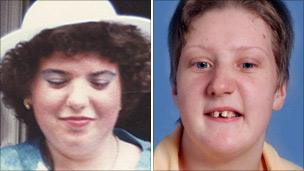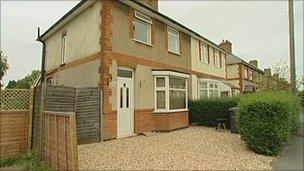Fiona Pilkington officers face misconduct proceedings
- Published

The family received only eight visits from officers in 10 years
Four officers face misconduct action after police "missed opportunities" to stop youths terrorising a woman who killed herself and her daughter.
Fiona Pilkington, 38, and 18-year-old Francecca Hardwick, who was disabled, died in October 2007 when Ms Pilkington set fire to their car.
The Independent Police Complaints Commission has found the family should have been identified as "vulnerable".
They had complained 33 times to Leicestershire Police about harassment.
The IPCC said an inspector, a sergeant and two police constables had a case to answer for misconduct, but police stressed that their jobs were not at risk.
In a report published on Tuesday, external, IPCC Commissioner Amerdeep Somal said: "There was nothing in place to ensure the Pilkington family were considered by police as vulnerable or repeat victims, contrary to the force's own strategy.
"Systems were in place for officers to have linked the catalogue of incidents but these were not well utilised.
'Gave up'
"Police missed several opportunities to take robust action, inadequately investigated criminal allegations on some occasions and failed to record information on their own intelligence system."
Over the course of 10 years, Ms Pilkington's home in Barwell was repeatedly targeted by groups of up to 16 youngsters, with stones, eggs and flour thrown at the house.
On one occasion, Francecca - who had the mental age of a four-year-old - was told to lift up her night-dress, while her brother Anthony was locked in a shed at knifepoint.
Ms Pilkington reported the incidents, as well as keeping a detailed log, but in total received only eight visits from officers.
An inquest in 2009 heard that six months before her death she had told her family: "I give up."
'Unreserved apologies'
The 38-year-old killed herself and Francecca after pouring petrol in their car in a lay-by on the A47 in nearby Earl Shilton.
The 180-page IPCC investigation report contains 92 findings on interaction police had with the family and on force procedures and systems.
It concludes that the police's error in not identifying Fiona Pilkington and her children as a vulnerable family "lay at the core" of their failure to provide a cohesive and effective approach.
Incidents were too often dealt with by police officers in isolation and with an unstructured approach, it said.
In response, Leicestershire's Chief Constable Simon Cole said: "We accept the findings and recommendations of the IPCC.
"We acknowledge, as we did following the inquest in 2009, that our actions failed to meet the family's needs and in retrospect we would have done things differently.
"We again offer our unreserved apologies for whatever extent the force's actions contributed to Fiona's mindset at the time that she and Francecca died.
"The IPCC acknowledge in their report that we have learnt many lessons from Fiona and Francecca's tragic deaths and that we continue to make significant changes to the way we deal and respond to these types of incidents."

Police failed to share information about the abuse targeted at the family home
Ms Pilkington's family are taking legal action against the police force, as well as Hinckley and Bosworth Borough Council and Leicestershire County Council.
Their solicitor Jocelyn Cockburn said they hoped the police watchdog's findings "will lead to improvements in the way that victims of anti-social behaviour and hate crime are dealt with by the police".
"The family know first-hand the terrible impact of such behaviour on vulnerable people and they dearly hope that other victims will be helped by this case," she said.
The case has led to a review of the way police forces deal with targeted anti-social behaviour.
A Home Office spokesperson said: "This government is shaking up the system to include better logging of complaints. This will ensure vulnerable victims are quickly identified and given the right support.
"We are also introducing a Community Trigger that will mean victims can compel police and other local agencies to take action against troublemakers. Never again should a vulnerable victim go so unheard for such a long time."
- Published7 October 2010